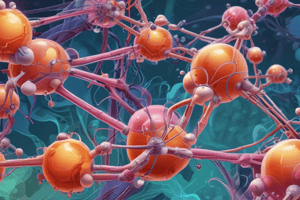Podcast
Questions and Answers
What is the primary structure of a protein?
What is the primary structure of a protein?
- The interaction between multiple protein subunits
- The order of amino acids in the polypeptide chain (correct)
- The spatial arrangement of multiple polypeptide chains
- The folding of the polypeptide chain into an alpha helix or beta sheet
Which level of protein structure is determined by the sequence of amino acids?
Which level of protein structure is determined by the sequence of amino acids?
- Quaternary structure
- Tertiary structure
- Secondary structure
- Primary structure (correct)
What characteristic defines the primary structure of a protein?
What characteristic defines the primary structure of a protein?
- Formation of alpha helices and beta sheets
- Association of multiple polypeptide chains
- Formation of disulfide bonds between cysteine residues
- Specific order of amino acids in the polypeptide chain (correct)
In the context of proteins, what does 'sequence' refer to?
In the context of proteins, what does 'sequence' refer to?
Which structural level of a protein is altered when the sequence of amino acids is changed?
Which structural level of a protein is altered when the sequence of amino acids is changed?
What is the significance of the primary structure of a protein?
What is the significance of the primary structure of a protein?
Why is the sequence of amino acids in a polypeptide chain crucial for protein function?
Why is the sequence of amino acids in a polypeptide chain crucial for protein function?
How does altering the sequence of amino acids in a polypeptide chain affect the protein?
How does altering the sequence of amino acids in a polypeptide chain affect the protein?
In the context of proteins, what does the term 'sequence' specifically refer to?
In the context of proteins, what does the term 'sequence' specifically refer to?
What distinguishes the primary structure of a protein from its tertiary structure?
What distinguishes the primary structure of a protein from its tertiary structure?
Flashcards
Primary Structure
Primary Structure
The unique order of amino acids in a protein chain. This sequence is like the instructions for building a protein.
Amino Acid Sequence
Amino Acid Sequence
The specific arrangement of amino acids in a polypeptide chain. This sequence determines all other levels of protein structure.
Primary Structure
Primary Structure
The level of protein structure determined by the sequence of amino acids. It's the foundation for the protein's shape and function.
Primary Structure's Significance
Primary Structure's Significance
Signup and view all the flashcards
Impact of Sequence
Impact of Sequence
Signup and view all the flashcards
Sequence Alteration
Sequence Alteration
Signup and view all the flashcards
Amino Acid Sequence
Amino Acid Sequence
Signup and view all the flashcards
Primary Structure Definition
Primary Structure Definition
Signup and view all the flashcards
Sequence & Structure Connection
Sequence & Structure Connection
Signup and view all the flashcards
Primary vs Tertiary
Primary vs Tertiary
Signup and view all the flashcards
Study Notes
- Proteins are large molecules made up of chains of amino acids
- They are found in every cell in the body and involved in most functions and life processes
- The sequence of amino acids in a protein is determined by DNA
- Proteins are different from carbohydrates and lipids, containing 16% nitrogen and being the single source for nitrogenous biomolecules
- Proteins have different levels of structural organization: primary, secondary, tertiary, and quaternary
- Primary structure refers to the order of amino acids in the polypeptide chain, determining the 3D conformation of a protein
- Insulin, as an example, has two polypeptide chains, and the primary structure differs in sequence between different forms of insulin
- Secondary, tertiary, and quaternary structures involve higher levels of organization and complexity, influencing the protein's function.
Studying That Suits You
Use AI to generate personalized quizzes and flashcards to suit your learning preferences.
Description
Test your knowledge on the structure and functions of proteins in organic chemistry and medical biochemistry. Learn about primary, secondary, tertiary, and quaternary protein structures, as well as the characteristics of peptide bonds and the structure-function relationship of proteins.



